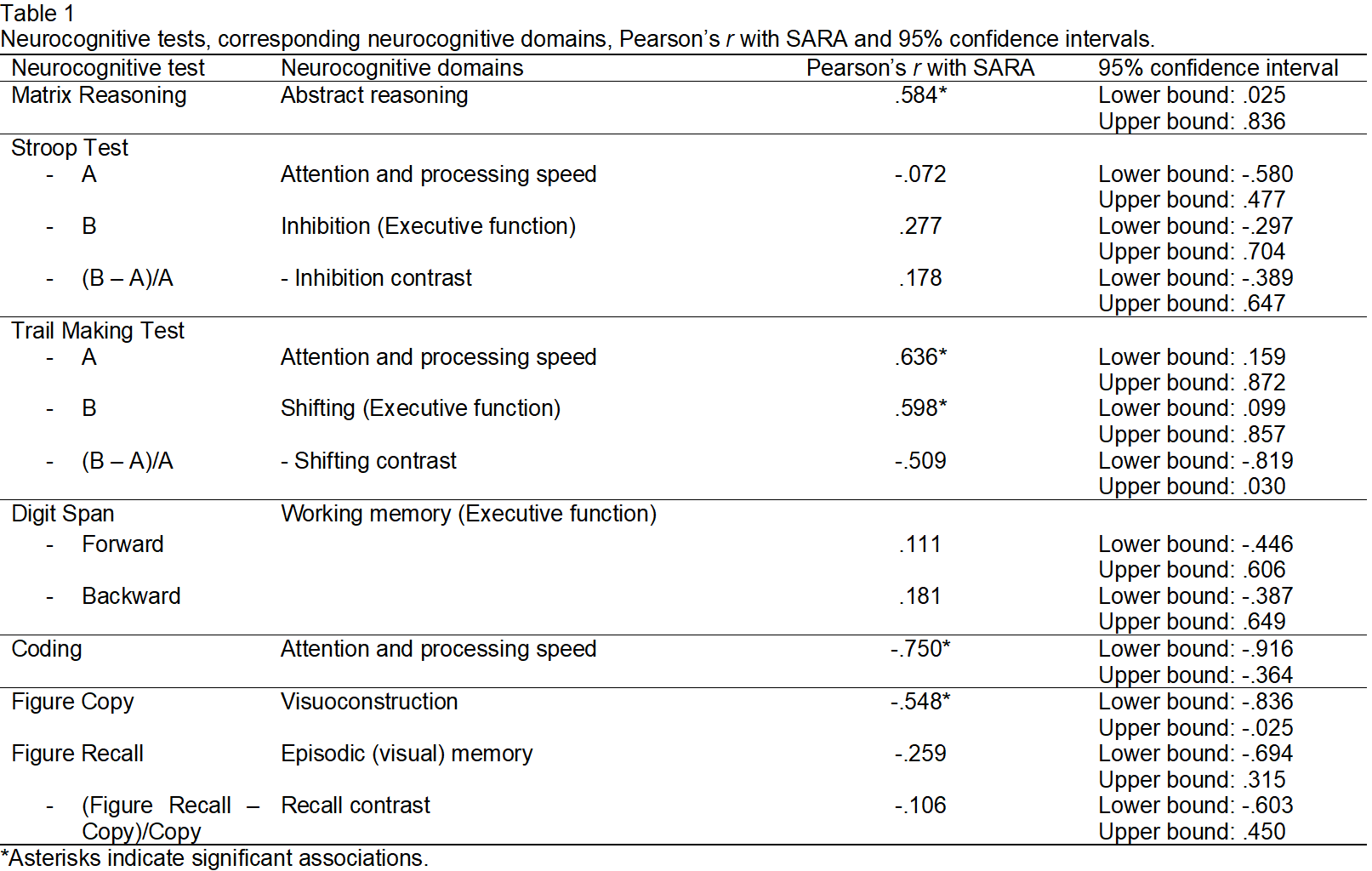Category: Ataxia
Objective: This preliminary study aims to examine whether motor and cognitive features in spinocerebellar ataxia type 3 (SCA3) are manifestations of a shared and parallel, or in part separate, neurodegenerative process.
Background: SCA3 is the commonest dominantly-inherited ataxia characterized by cerebellar degeneration [1]. Connections between cerebellum, prefrontal and parietal cortex may lead to cerebellar cognitive affective syndrome (CCAS) [2]. CCAS typically involves neurocognitive changes in abstract reasoning, executive function (EF), attention and processing speed, episodic memory, and visuoconstruction [3]. This impairment may be exacerbated by ataxia severity [4], with correlation reported between Scale for the Assessment and Rating of Ataxia (SARA) and CCAS Scale in Friedreich ataxia [5]. Alternatively, neurodegeneration in SCA3 may simultaneously affect CCAS and coordination centers [1].
Method: Fourteen SCA3 patients (Age: 40.4 ± 10.4 years, Gender: 9 Male 5 Female) underwent SARA and neurocognitive tests. Pearson’s r and its 95% confidence interval (CI) were used to determine the association strength between ataxia severity and neurocognitive performances and significance level, respectively. Pearson’ r values of 0.10, 0.30, and 0.50 indicate small, moderate, and large effect sizes, respectively [6].
Results: Greater ataxia severity was correlated with better abstract reasoning (p = .03) and poorer shifting (p = .02), attention and processing speed (p = .002–.01), and visuoconstruction (p = .04). No correlation was found in other neurocognitive tests (p > .05) [table1].
Conclusion: Association between greater ataxia severity and better abstract reasoning suggests that cognitive reserves such as premorbid intelligence and education level may selectively preserve general intelligence. Shifting and attention and processing speed may be exacerbated by a reduced motor execution speed. Ataxia severity is unlikely to fully explain the CCAS in SCA3 as association was not found with other neurocognitive tests that are highly motor-dependent. The findings suggest that CCAS in SCA3 may be at least partially independent from the neurodegenerative process responsible for ataxia symptoms. Inclusion of larger samples and healthy controls, and correlation with neuroimaging data are needed to confirm our interpretation of findings.
References: [1] Bodranghien F, Bastian A, Casali C, et al. Consensus paper: Revisiting the symptoms and signs of cerebellar syndrome. The Cerebellum 2016;15(3):369-391. [2] Bostan AC, Dum RP, Strick PL. Cerebellar networks with the cerebral cortex and basal ganglia. Trends in Cognitive Sciences 2013;17(5):241-254. [3] Ray KL, Ragland JD, MacDonald AW, et al. Dynamic reorganization of the frontal parietal network during cognitive control and episodic memory. Cognitive, Affective, & Behavioural Neuroscience 2020;20(1):76-90. [4] Braga-Neto P, Pedroso JL, Alessi H, et al. Cerebellar cognitive affective syndrome in Machado Joseph disease: Core clinical features. The Cerebellum 2012;11(2):549-556. [5] Naeije G, Rai M, Allaerts N, et al. Cerebellar cognitive disorder parallels cerebellar motor symptoms in Friedreich ataxia. Annals of Clinical & Translational Neurology 2020;7(6):1050-1054. [6] Cohen J. Statistical power analysis for the behavioural sciences. Academic press, 2013.
To cite this abstract in AMA style:
KH. Yap, S. Azmin, SH. Mat Desa, HN. Achok, N. Mohamed Ibrahim. CEREBELLAR COGNITIVE AFFECTIVE SYNDROME IN SPINOCEREBELLAR ATAXIA TYPE 3 [abstract]. Mov Disord. 2021; 36 (suppl 1). https://www.mdsabstracts.org/abstract/cerebellar-cognitive-affective-syndrome-in-spinocerebellar-ataxia-type-3/. Accessed April 3, 2025.« Back to MDS Virtual Congress 2021
MDS Abstracts - https://www.mdsabstracts.org/abstract/cerebellar-cognitive-affective-syndrome-in-spinocerebellar-ataxia-type-3/

